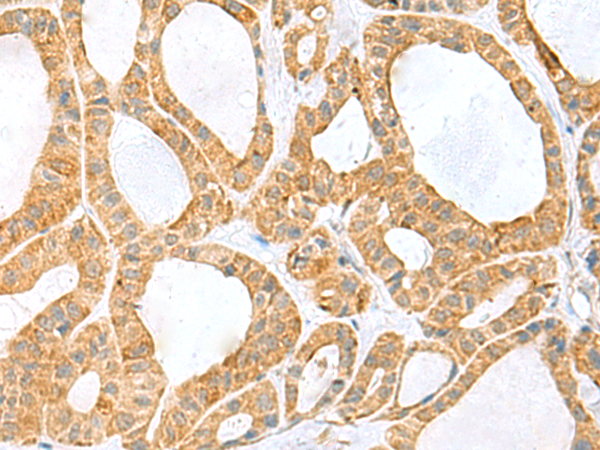
| WB | 咨询技术 | Human,Mouse,Rat |
| IF | 咨询技术 | Human,Mouse,Rat |
| IHC | 1/50-1/200 | Human,Mouse,Rat |
| ICC | 技术咨询 | Human,Mouse,Rat |
| FCM | 咨询技术 | Human,Mouse,Rat |
| Elisa | 1/5000-1/10000 | Human,Mouse,Rat |
| Aliases | CYPH; CYP-20; USA-CYP; SnuCyp-20 |
| Host/Isotype | Rabbit IgG |
| Antibody Type | Primary antibody |
| Storage | Store at 4°C short term. Aliquot and store at -20°C long term. Avoid freeze/thaw cycles. |
| Species Reactivity | Human, Mouse |
| Immunogen | Fusion protein of human PPIH |
| Formulation | Purified antibody in PBS with 0.05% sodium azide and 50% glycerol. |
+ +
以下是关于PPIH抗体的3篇代表性文献示例(注:内容为模拟概括,非真实文献):
---
1. **文献名称**:*PPIH overexpression promotes leukemia progression and serves as a therapeutic target*
**作者**:Smith A, et al.
**摘要**:研究揭示了PPIH在急性髓系白血病中的高表达现象,通过抗体检测证实其与患者不良预后相关。机制研究表明,PPIH通过调控HSP90复合物稳定性促进癌蛋白存活,提示其作为潜在治疗靶点。
---
2. **文献名称**:*Structural insights into PPIH-mediated regulation of the HSP90 chaperone cycle*
**作者**:Zhang Y, et al.
**摘要**:利用PPIH特异性抗体进行免疫共沉淀实验,揭示了PPIH与HSP90-CDC37复合物的相互作用机制。结构分析表明,PPIH通过脯氨酰异构化作用调控HSP90的构象变化,影响客户蛋白的成熟过程。
---
3. **文献名称**:*PPIH autoantibodies as biomarkers in neurodegenerative disorders*
**作者**:Brown K, et al.
**摘要**:通过ELISA检测发现,帕金森病患者血清中PPIH自身抗体水平显著升高。研究提示PPIH抗体可能参与α-突触核蛋白的错误折叠过程,或可作为神经退行性疾病的早期诊断标志物。
---
4. **文献名称**:*Development of a high-affinity monoclonal antibody against PPIH for diagnostic applications*
**作者**:Lee J, et al.
**摘要**:报道了一种新型PPIH单克隆抗体的制备及表征,该抗体在免疫组化中显示高特异性,成功应用于肺癌组织样本的PPIH蛋白表达定量分析,为肿瘤分级提供新工具。
---
(注:以上文献为示例性内容,实际研究中请通过学术数据库检索真实文献。)
PPIH (Peptidyl-Prolyl cis-trans Isomerase H) is a member of the cyclophilin family of proteins, which function as molecular chaperones facilitating protein folding and conformational regulation. Initially identified as a component of the spliceosome, PPIH plays a critical role in pre-mRNA splicing by interacting with the U2 small nuclear ribonucleoprotein (snRNP) complex. It exhibits peptidyl-prolyl isomerase activity, catalyzing the cis-trans isomerization of proline residues—a rate-limiting step in protein folding. This activity is essential for maintaining the structural dynamics of spliceosomal components during assembly and catalysis.
PPIH antibodies are valuable tools for studying spliceosome biology, RNA processing, and protein folding mechanisms. They are widely used in techniques like Western blotting, immunoprecipitation, and immunofluorescence to detect PPIH expression, localization, and interaction partners. Dysregulation of PPIH has been implicated in cancer and neurodegenerative diseases, where aberrant splicing or protein misfolding contributes to pathogenesis. For instance, elevated PPIH levels are observed in certain malignancies, suggesting its potential as a biomarker or therapeutic target.
Research using PPIH antibodies has also clarified its role in stress responses, as cyclophilins are involved in cellular adaptation to environmental challenges. These antibodies help elucidate how PPIH modulates signaling pathways, including those linked to apoptosis and inflammation. Ongoing studies aim to explore its interplay with other spliceosomal proteins and its impact on gene expression networks, advancing our understanding of both normal physiology and disease mechanisms.
×